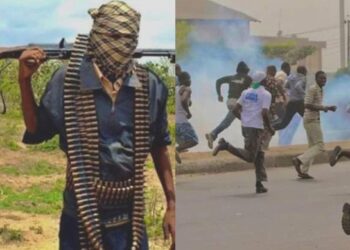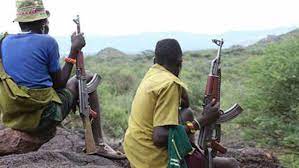A former war commander, Brigadier-General Abdullah Sabi Ishaq (rtd), has said the readiness of the people of Borno state coupled with the political will were major reasons the ex-Boko Haram fighters are surrendering in droves.
He also said “the ultimate goal of the Borno Model is to reintegrate or bring together the ex-combatants and their people so that they could come together and live peacefully with one another.”
“On the 29 August 2021, the Borno State Governor Prof Babagana Umara Zulum organized one day stakeholders’ meeting at the Multipurpose Hall of the Government House Maiduguri where issues of mass defection of BHT/ISWAP fighters were discussed.
“In attendance were members of the National and State Assemblies, Borno Elders, military and paramilitary commanders, selected victims, traditional and religious leaders, as well as civil society organisations.
“Prof Babagana Zulum pointed out that some of the repentant terrorists were forced to remain in the bush to function as farmers, cooks and domestic servants to the terrorists. He added that special consideration would be given to those categories during screening. Various stakeholders in Borno State agreed to accept and forgive the initial 3900 repentant Boko Haram fighters who have surrendered to troops,” Brig-Gen Ishaq stated this in a presentation Tuesday evening during a public lecture held at the Muhammad Indimi International Conference Centre, University of Maiduguri.
The lecture was titled “The Impact of Borno Model in the fight against Terrorists in Borno state.”
Addressing the gathering, Ishaq, who is the special adviser to Borno state governor on security, said top BH/ISWAP commanders who had surrendered at one time or the other, continued to encourage their colleagues in the bush to accept Zulum’s call for peaceful resolution and end the over a decade state of war.
The general , who at different times was in Liberia, Sierra Leone and the theatre of war in Borno state, said the “Borno Model simply means the use of dialogue BH/ISWAP STATE to persuade fighters to lay down their arms to troops at the various reception centres and embrace peace”, noting that, “it is a community-driven initiative geared toward s “win-win” situation where both parties stand to gain from the Model.”
The retired military chief further said “in the implementation of the Borno Model, the Borno State Government considered restorative justice, reconciliation and reparation leading to the combination modules of what UN adopted in Sierra Leone and Libya and what suits the local situation at home and the people of Borno.”
Trust and political will
According to him, “the Model is unique and involves, Triple D – Disarmament, Demobilization and Deradicalization and Triple R – Rehabilitation, Reconciliation and Reintegration. Where Disarmament means the act of reducing, limiting or retrieving from surrendered BH/ISWAP fighters.”
On the political will, he said there was mutual trust between the ex-fighters and the governor.
“One of the major factors responsible for the ongoing surrendering of BH and ISWAP fighters is the political will. Professor Babagana Umara Zulum assured them based on their request that they would not be taken to Giwa Barracks or Operation Safe Corridor.
“He also promised them that the State will rehabilitate, reconcile and reintegrate them accordingly. Furthermore, the reception given to the first set of repentant fighters on arrival at the Shokari Camp on 5 July 2021 and the visit of His Excellency to the camp to address them encouraged a lot of them to drop their arms,” he said.
Further importance of the model
Speaking on the non-kinetic approach model adopted by the Borno state government, the governor’s aide said it greatly reduced tension and the level of crimes and criminalities often associated with the criminal elements.
“It is worthy to state that since the commencement of the application of non-kinetic or Borno Model, over 100,000 BH/ISWAP fighters and their families have surrendered unconditionally to the Borno State Government. Also, 6900 minors and low risk clients were reintegrated in Six Batches and majority are farming in their various localities.
“Other gains of the Model include: Surrendered fighters are facilitating and persuading their colleagues on daily basis to drop their arms and embrace peace; Surrendered fighters have provided credible information to the land and Air Components of OPHK about BH/ISWAP hideout and logistics camps; BH bomb experts have briefed Engr Comds of OPHK how and where they planted IEDs in the entire Sambisa area.
“Attacks and ambushes on troops’ patrol and logistics convoys have reduced within BH areas of operational responsibilities; the rate of kidnapping of persons along Maiduguri-Damaturu and Maiduguri –Mongunu roads has reduced drastically; farmers now have access to their farmland; Nineteen Chibok school girls and 6 other women kidnapped during church service in Chibok 2020 and 2021 respectively were released without payment for ransom.”
He listed other gains to include “slave farmers of BH/ISWAP fighters have gained freedom and were united with their families; some Almajiri boys that were captured and taken to Sambisa were reunited with their families through family tracing by social workers of the Women Affairs Ministry; kidnapped girls that were forcefully married to BH/ISWAP fighters have regained freedom and returned to their parents in Maiduguri and Bama town; pregnant women and nursing mothers that were captured when BH invaded Bama town on 2 September 2014 have either returned the children to their biological fathers or returned to their legitimate husbands in Bama.”
He said, during the reintegration process, efforts were made to bring two or more groups together that were hitherto in conflict or war where interestingly, the stories or feedback of those that were forcefully kidnapped by the terrorists are now back to their communities.
While underscoring the need to further deepen the Borno model, Ishaq recalled that the attack on Auno few kilometers to Maiduguri by terrorists on 20 February 2020 where 30 passengers were killed, a number of people abducted and 18 vehicles burnt, gives credence to the fact that the kinetic approach was not winning the fire fight against the terrorists.
“It was a known fact that in spite of the government efforts in area of security movements of about 5-10 kilometers outside liberated towns were not encouraged except with military or police escorts. Even with military or police escorts the chances of very important person (VIPs) or commuters becoming victims of ambushes or TEDs attacks were 50:50,” Ishaq said.
According to him, the model also required the government to tackle the drivers of insecurity in the region, which in the words of Zulum, include “lingering weakness in service delivery, poverty, unemployment, corruption, factors and hi high level of illiteracy”.
He also spoke on the unity of purpose between the military and paramilitary groups, saying there was “the existing synergy between the military and paramilitary in the spirit of HADIN KAI has guaranteed and promoted the principle of joint operation in the Theatre.
“The Nigerian Air Force has been providing timely air support to the troops in the front line. Likewise, personnel of State Services and intelligence units of Nigeria Police and civil defence provide actionable information to the military. The military and paramilitary commanders in Operation HADIN KAI meet monthly under the leadership of 7 Division Garrison Commander to discuss security issues. They equally have a platform for daily dissemination of information within the Theatre.”
The figure
He also gave the figure of those who had been reintegrated.
“So far 6900 minors and low risk have been reintegrated back to their communities and most of them are engaged in farming. Interestingly, there was no single case of rejection of any person from the communities because the process is community driven.
“The community representatives’ screen and recommend those to be reintegrated back to their community and also transport them back to their towns and villages.
“It is worthy to state that since commencement of non-kinetic approach or Borno Model in the fight against terrorists in Borno State, over 100,000 BH/ISWAP fighters, captive farmers and their families have surrendered unconditionally to the Borno State Government.
“At the end of the DSS screening, those recommended for reintegration are further screened by the representatives of Local Government Council, the Bulamas, community leaders, members of the CJTF and Hunters.
“The involvement of the community leaders also ensures that those that committed Human Rights violations are not recycled back to the society. At the end of the screening exercise by the leadership, two weeks pre-community reintegration lectures were organized where the clients are prepared for communal lifestyle and respect for rule of law,” General Ishaq said.




